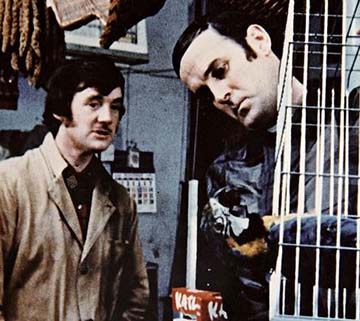A thousand words for death
UK – How would you like to die, linguistically? When the lexicographers were compiling their citations for the Oxford English Dictionary, they came across this remarkable one, in a US graveyard: Caroline, wife of EJ Langston, born on March 23 1833. Passed out Dec 18 1867.
It’s the earliest recorded use of pass out meaning to die. The usage continued into the 20th century, but I doubt that it would be used now. Today we associate passing out with excessive tiredness, drugs, or drink. I don’t want to be passed out on my gravestone.
Nor do I want any of the glorious deathy lexicon that accompanied the customer who brought Monty Python‘s legendary dead parrot back to the shop:
Customer: “‘E’s bleedin’ demised!”
Owner: “No no! ‘E’s pining!”
Customer: “‘E’s not pinin’! ‘E’s passed on! This parrot is no more! ‘E ‘as ceased to be! ‘E’s expired and gone to meet ‘is maker! ‘E’s a stiff! Bereft of life, ‘e rests in peace! If you ‘adn’t nailed ‘im to the perch ‘e’d be pushin’ up the daisies! ‘Is metabolic processes are now ‘istory! ‘E’s off the twig! ‘E’s kicked the bucket! ‘E’s shuffled off ‘is mortal coil, run down the curtain, and joined the bleedin’ choir invisible!”
This profusion of defunctive synonymy is not a modern phenomenon. An Anglo-Saxon equivalent to the Monty Python scriptwriters would have had more than 40 expressions in Old English to choose from. His customer could have described his parrot as gone (gegan), departed (leoran), fallen (gefeallan), died away (acwelan), parted from life (linnan ealdre), gone on a journey (geferan), totally died off (becwelan), with its spirit sent forth (gast onsendan), completely scattered (tostencan), or glided away (glidan). It’s plain that the Anglo-Saxons were as concerned about finding different ways to talk about death as we are today.
A remarkable creativity surrounds the vocabulary of death. The words and expressions range from the solemn and dignified to the jocular and mischievous, and they reflect the changing ways we have thought about life and death over the centuries. The early verbs are rather mundane and encompass literal notions of “leaving”, such as wend, go out of this world, fare, leave and part. Only later do we get a sense of where one is going to, with an initial focus on ancestors evolving into the notion of a divine presence: be gathered to one’s fathers, go over to the majority, go home, pass to one’s reward, launch into eternity, go to glory, meet one’s Maker, get one’s call.
The list of verbs for dying in the Historical Thesaurus displays a remarkable inventiveness, as people struggled to find fresh forms of expression. The language of death is inevitably euphemistic, but few of the verbs or idioms are elaborate or opaque. In fact, the history of verbs for dying displays a real simplicity: most consist of only one syllable. Even the euphemisms of later centuries have a markedly succinct character (slip one’s cable, kick the bucket).
There are more than a thousand words for death categorised in the Thesaurus. People seem always to be searching for ways of renewing their stock of apt metaphors. The Bible is one source, as seen in Wycliffe’s “disperish”, Tyndale’s “depart”, Coverdale’s “die the death”, and the King James Bible‘s “give up the ghost” and “the silver cord is loosed”. Classical texts are another: Greek mythology is the source of “take the ferry”; Latin the source of “pay one’s debt to nature” and “go over to the majority”. Shipping provides “slip one’s cable”; the livestock industry “kick the bucket”; pastimes “peg out” and “cash in one’s chips”; mining “go up the flume”; finance “hand in one’s accounts”. Wartime produces a wide range of slang expressions (pack up, cop it, conk, stop one, buy it) as well as more solemn idioms (shed one’s blood, fall a victim).
There’s a lot of idiosyncrasy. Many coinages are known from just a single user. People seem to be quite discerning when it comes to judging the acceptable terminology of death, and several innovations simply never catch on. Some eras were clearly more inventive than others, reflecting times of major English lexical expansion, notably the end of the 16th century (relent, unbreathe, transpass, lose one’s breath) and the euphemism-conscious 19th century, where a fifth of the items in the Thesaurus appear for the first time (stiffen, drop short, step out, walk, perch, knock over). A significant strand also originates in individual authors and texts, such as Shakespeare‘s “shuffle off this mortal coil”.
We also see a great deal of stylistic variation. Class division is in operation: at one extreme, upper-class slang (walk and pip); at the other, the language of the underworld (croak, kiss off, perch). There are signs of journalese (succumb), because finding an appropriate way to report a death is a perpetual challenge. Formality and solemnity contrast with colloquialism and slang: “yield the ghost”, “expire” and “pass away” versus go “off the hooks”, “kick the bucket” and “zonk”. Some constructions evidently have permanent appeal because of their succinct and enigmatic character, such as the popularity of snuff it, peg it, buy it, cop it, off it, crease it, have had it. It’s possible to see changes in fashion, such as the vogue for colloquial usages of “off” in the middle of the 18th century (move off, pop off, pack off, hop off).
But some things don’t change. Pass away has been with us since the 14th century. And, in a usage that dates back to the 12th, we still do say that people, simply, died. That’ll do me.
Photo: Allstar. A profusion of defunctive synonymy … Monty Python’s ‘Dead Parrot’ sketch.
Originally published by The Guardian, author David Crystal.


Leave a Comment
You must be logged in to post a comment.